Related Research Articles
Henry Ainsworth (1571–1622) was an English Nonconformist clergyman and scholar. He led the Ancient Church, a Brownist or English Separatist congregation in Amsterdam alongside Francis Johnson from 1597, and after their split led his own congregation. His translations of and commentaries on the Hebrew scriptures were influential for centuries.

The Book of Psalms, also known as the Psalms, or the Psalter, is the first book of the Ketuvim ("Writings"), the third section of the Tanakh, and a book of the Old Testament. The title is derived from the Greek translation, ψαλμοί, meaning "instrumental music" and, by extension, "the words accompanying the music". The book is an anthology of individual Hebrew religious hymns, with 150 in the Jewish and Western Christian tradition and more in the Eastern Christian churches. Many are linked to the name of David, but modern mainstream scholarship rejects his authorship, instead attributing the composition of the psalms to various authors writing between the 9th and 5th centuries BC. In the Quran, the Arabic word ‘Zabur’ is used for the Psalms of David in the Hebrew Bible.

Song of Ascents is a title given to fifteen of the Psalms, 120–134, each starting with the superscription Shir Hama'aloth, or, in the case of Psalm 121, Shir Lama'aloth. They are also variously called Gradual Psalms, Fifteen Psalms, Songs of Degrees, Songs of Steps, songs for going up to worship or Pilgrim Songs.
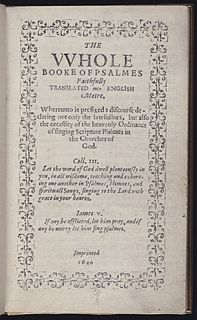
The Whole Booke of Psalmes Faithfully Translated into English Metre, commonly called the Bay Psalm Book, is a metrical psalter first printed in 1640 in Cambridge, Massachusetts. It was the first book printed in British North America. The psalms in it are metrical translations into English. The translations are not particularly polished, and none have remained in use, although some of the tunes to which they were sung have survived ; however, its production, just 20 years after the Pilgrims' arrival at Plymouth, Massachusetts, represents a considerable achievement. It went through several editions and remained in use for well over a century.
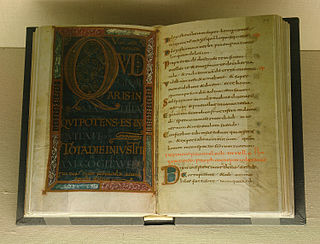
A psalter is a volume containing the Book of Psalms, often with other devotional material bound in as well, such as a liturgical calendar and litany of the Saints. Until the emergence of the book of hours in the Late Middle Ages, psalters were the books most widely owned by wealthy lay persons. They were commonly used for learning to read. Many Psalters were richly illuminated, and they include some of the most spectacular surviving examples of medieval book art.

The New American Bible (NAB) is an English translation of the Bible first published in 1970. The 1986 Revised NAB is the basis of the revised Lectionary, and it is the only translation approved for use at Mass in the Latin-rite Catholic dioceses of the United States and the Philippines, and the 1970 first edition is also an approved Bible translation by the Episcopal Church in the United States.

A metrical psalter is a kind of Bible translation: a book containing a verse translation of all or part of the Book of Psalms in vernacular poetry, meant to be sung as hymns in a church. Some metrical psalters include melodies or harmonisations. The composition of metrical psalters was a large enterprise of the Protestant Reformation, especially in its Calvinist manifestation.
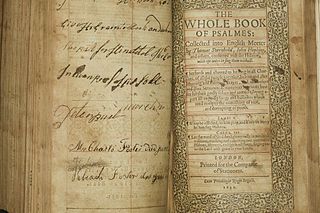
Thomas Sternhold (1500–1549) was an English courtier and the principal author of the first English metrical version of the Psalms, originally attached to the Prayer-Book as augmented by John Hopkins.
Decisions concerning the conduct of public worship in the Church of Scotland are entirely at the discretion of the parish minister. As a result, a wide variety of musical resources are used. However, at various times in its history, the General Assembly has commissioned volumes of psalms and hymns for use by congregations.
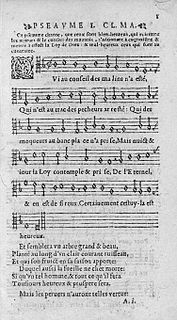
Exclusive psalmody is the practice of singing only the biblical Psalms in congregational singing as worship. Today it is practised by several Protestant, especially Reformed denominations. Hymns besides the Psalms have been composed by Christians since the earliest days of the church, but psalms were preferred by the early church and used almost exclusively until the end of the fourth century. During the Protestant Reformation, Martin Luther and many other reformers, including those associated with the Reformed tradition, used hymns as well as psalms, but John Calvin preferred the Psalms and they were the only music allowed for worship in Geneva. This became the norm for the next 200 years of Reformed worship. Hymnody became acceptable again for the Reformed in the middle of the nineteenth century, though several denominations, notably the Reformed Presbyterians, continue the practice of exclusive psalmody.

The Genevan Psalter, also known as The Huguenot Psalter, is a metrical psalter in French created under the supervision of John Calvin for liturgical use by the Reformed churches of the city of Geneva in the sixteenth century.

The Becker Psalter is a German metrical psalter authored by the Leipzig theologian Cornelius Becker and first published by Jakob Apel in Leipzig in 1602 under the title Der Psalter Davids Gesangweis. Several composers set the psalms contained in the volume, notably Heinrich Schütz, whose four-part chorales were published in 1628 and revised and expanded in 1661.
The Benedictine Rite is the particular form of Mass and Liturgy celebrated by the Benedictine Order, as based on the writings of St. Benedict on the topic.

The Latin Psalters are the translations of the Book of Psalms into the Latin language. They are the premier liturgical resource used in the Liturgy of the Hours of the Latin Rites of the Roman Catholic Church.
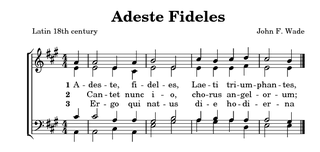
A hymn tune is the melody of a musical composition to which a hymn text is sung. Musically speaking, a hymn is generally understood to have four-part harmony, a fast harmonic rhythm, with or without refrain or chorus.
A kathisma, literally, "seat", is a division of the Psalter, used in the Eastern Orthodox and Byzantine Rite Catholic churches. The word may also describe a hymn sung at Matins, a seat used in monastic churches, or a type of monastic establishment.

Psalm 146 is the 146th psalm of the Book of Psalms, beginning in English in the King James Version, "Praise ye the LORD. Praise the LORD, O my soul". In Latin, it is known as "Lauda anima mea Dominum".

Psalm 42 is the 42nd psalm of the Book of Psalms, often known in English by its incipit, "As the hart panteth after the water brooks". The Book of Psalms is part of the third section of the Hebrew Bible, and a book of the Christian Old Testament. In the Hebrew Bible, Psalm 42 opens the second of the five books (divisions) of Psalms, also known as the "Elohistic Psalter" because the word YHWH is rarely used and God is generally referred to as "Elohim".

Psalm 1 is the first psalm of the Book of Psalms, beginning in the English King James Version: "Blessed is the man", and forming "an appropriate prologue" to the whole collection. The Book of Psalms is part of the third section of the Hebrew Bible, and a book of the Christian Old Testament. In Latin, this psalm is known as Beatus vir or Beatus vir, qui non abiit.
The Great Psalms Scroll, also referred to as 11Q5, is the most substantial and well preserved Dead Sea Scrolls Psalms manuscript of the thirty-seven discovered in the Qumran caves, six of which were discovered in Cave 11.
References
- ↑ Knight, G. L.(2003). Hymn. In Encarta Encyclopedia 2004 [computer software]. Microsoft.
- ↑ "Allen Lott introduces the Ainsworth Psalter". Pitts Theology Library, Emory University.